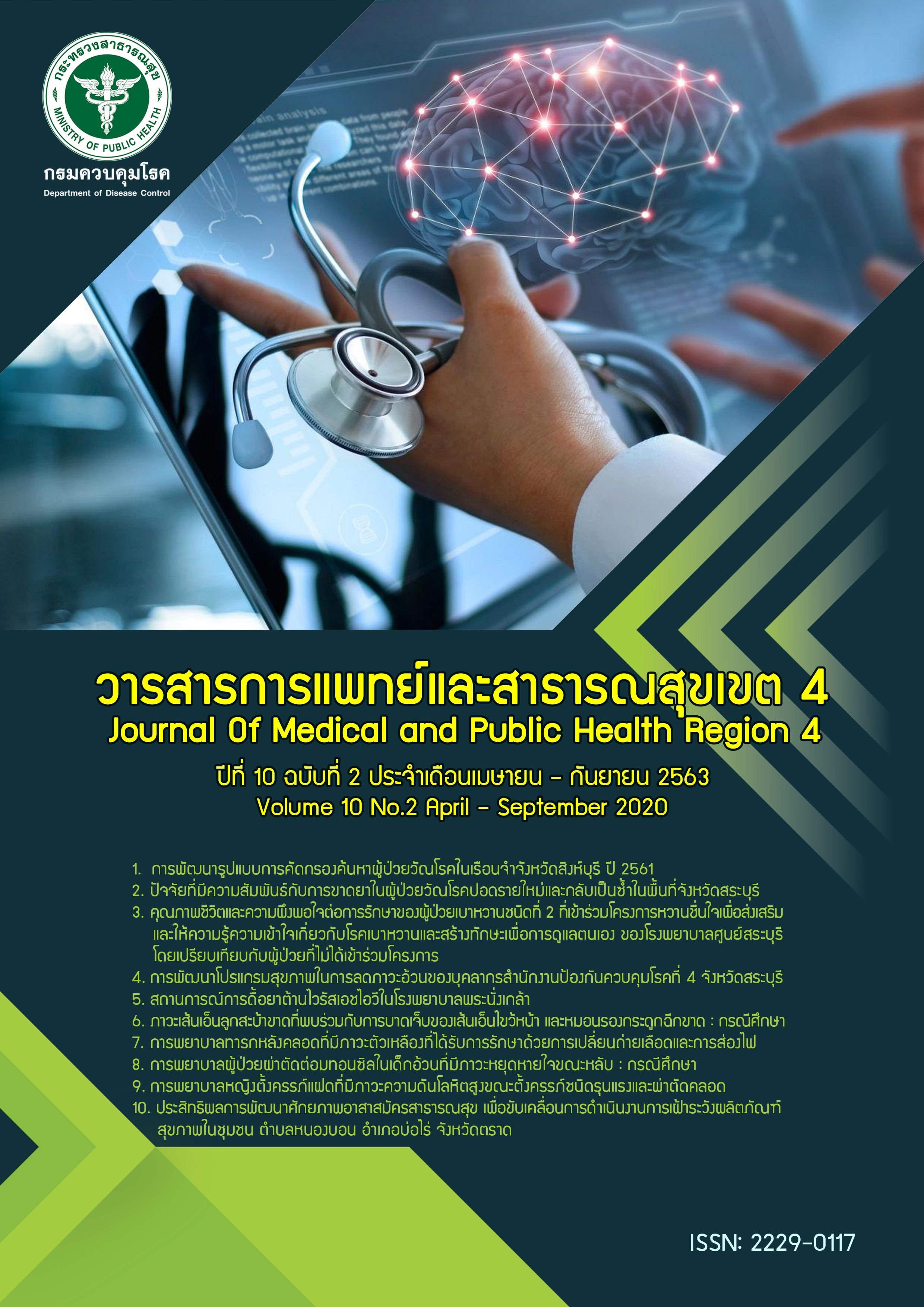Nursing Care for Twin Pregnancy with Severe Pre-eclampsia and Cesarean Section
Main Article Content
Abstract
Severe pre-eclampsia is an obstetric complication, highly prevalence. Complications in the pregnant women are including, seizure, stroke, and HELLP syndrome. This is a very severe complication in pregnancy which causes the death of the maternal and newborn. Especially, twin pregnancy hypertension is more highly double risk to severe pre-eclampsia, more than single pregnancy. Therefore, the nurse can provide appropriate nursing care for patients at all stages from the beginning of pregnancy, antenatal care, delivery care and postpartum care. Case study: A 35 years old patient found that the complication during pregnancy was the second gravid, parity 1, with twin at 37 weeks and got a severe preeclampsia and missed follow up at antenatal care clinic. Firstly admitted at labour room, the pregnant women has body temperature 37.1 °C, blood pressure 160/110 mmHg, pulse rate 94 beats per minute, respiration rate 22 breaths per minute, no labour pain, good fetal movement, and cervix dilated 1 cm. Magnesium sulfate and hydralazine administration protocol was used to prevent seizure and decrease hypertension. Childbirth stage was no progress and worse clinical symptom, therefore physician decided to set cesarean section for safe maternal and fetus. After cesarean section, the blood pressure can be controlled, normal uterine contraction. Maternal and newborn were no complication. Five days after cesarean section, maternal and newborn were discharge.
Article Details
References
2. กองยุทธศาสตร์และแผนงาน สำนักงานปลัดกระทรวงสาธารณสุข. สถิติสาธารณสุข พ.ศ.2559. นนทบุรีสำนักงานปลัดกระทรวงสาธารณสุข กระทรวงสาธารณสุข, 2560.
3. ดิฐกานต์ บริบูรณ์หิรัญสาร. การตั้งครรภ์แฝด. [อินเทอร์เน็ต]. กรุงเทพฯ: คณะแพทยศาสตร์ศิริราชพยาบาล; 2553 [เข้าถึงเมื่อ 10 พ.ค. 2563]. เข้าถึงได้จาก https://www.si.mahidol.ac.th/sidoctor/e-pl/articledetail.asp?id=399.
4. ตรีภพ เลิศบรรณพงษ์. ครรภ์แฝด. ใน ประภัทร วานิชพงษ์พันธุ์, กุศล รัศมีเจริญ และตรีภพ เลิศบรรณพงษ์ (บรรณาธิการ), ตำราสูติศาสตร์. กรุงเทพฯ: พี.เอ.ลีฟวิ่ง จำกัด; 2560.
5. ตวงสิทธิ์ วัฒกนารา. ความดันโลหิตสูงขณะตั้งครรภ์. ใน ประภัทร วานิชพงษ์พันธุ์, กุศล รัศมีเจริญ และตรีภพ เลิศบรรณพงษ์ (บรรณาธิการ), ตำราสูติศาสตร์. กรุงเทพฯ: พี.เอ.ลีฟวิ่ง จำกัด; 2560.
6. กิติพร กางการ. การพยาบาลผู้คลอดที่มีภาวะความดันโลหิตสูงชนิดรุนแรงขณะตั้งครรภ์ ร่วมกับการคลอดก่อนกำหนดในระยะคลอด : กรณีศึกษา 2 ราย. วารสารโรงพยาบาลมหาสารคาม 2562; 16: 23-35.
7. สุชาดา เตชวาทกุล. บทบาทพยาบาลในการป้องกันภาวะความดันโลหิตสูงในสตรีตั้งครรภ์. วารสารเกื้อการุณย์ 2558; 22: 7-19.
8. สมฤดี กีรตวนิชเสถียร, ภารดี ชาวนรินทร์, นาถสุดา โชติวัฒนากุลชัย. บทบาทของพยาบาลในการดูแลสตรีตั้งครรภ์ที่มีภาวะความดันโลหิตสูง. วารสารมหาวิทยาลัยคริสเตียน 2562; 25: 112-125.


